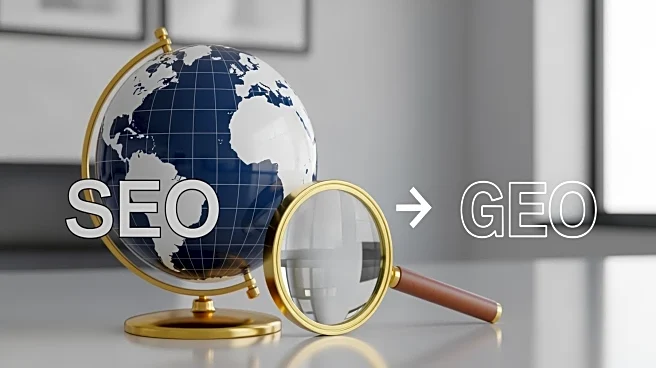What's Happening?
Dr. Daniel Hulme, WPP's Chief AI Officer, has highlighted a significant shift in digital marketing strategies from Search Engine Optimization (SEO) to Generative Engine Optimization (GEO). This transition
is driven by the increasing influence of personal AIs and chatbots on consumer search behavior. Hulme explains that while SEO remains a crucial tool, its dominance is waning as AI technologies begin to shape shopper journeys. With predictions that 25% of searches will bypass traditional engines by next year, GEO is becoming essential for brands to maintain visibility in AI-generated responses. Unlike SEO, which focuses on keyword matching, GEO optimizes content for visibility in AI responses, requiring brands to ensure their presence in AI training data.
Why It's Important?
The shift from SEO to GEO represents a fundamental change in how brands approach digital marketing and discoverability. As AI technologies become more prevalent, brands must adapt to ensure they are visible in AI-generated search results. This transition offers established brands a chance to refine their strategies and presents newcomers with opportunities to gain visibility. GEO-driven traffic is typically highly qualified, indicating genuine purchase intent from users who have researched via AI. Brands that fail to adapt may find themselves excluded from AI-generated recommendations, impacting their market presence and competitiveness.
What's Next?
Brands are encouraged to audit what AI models 'know' about them by querying multiple models about their company and products. This will help identify any outdated information or reputational issues that may affect their visibility in AI responses. Companies should prioritize fixing high-risk associations and refine their content strategies to optimize for semantic understanding and knowledge extraction. As AI experts continue to develop best practices, brands should regularly document AI model responses to track changes and adapt their strategies accordingly.
Beyond the Headlines
The transition to GEO is not just a new marketing channel but a fundamental shift in brand discoverability in an AI-mediated world. Training datasets are increasingly curated, influencing how brands are represented in future AI models. Brands must consider how their current content will impact their representation in AI training data, ensuring they remain part of the conversation as GEO reshapes brand discovery.









